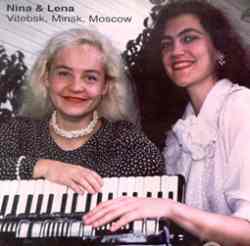
Program:
J.S. Bach: Passacaglia in Cm
F. Mendelssohn: Rondo-Capricciozo
F. Pulenk: Branle
McDowell: Dance of the Witches
A. Piazzolla: Undertango
A. Piazzolla: Libertango
V. Chernikov: Akh Ty, Step Shirokaya
S. Rachmaninof / A. Popov: Italian Polka
S. Tikhonov: More Than Words
A. Shaposhnik: Chameleon
A. Popov: Podgornaya
S. Tikhonov: Ranch of Merry Jack
total time: 49:53
released: 1997
review date: January 1999
label: Fumiko Records
803 E. Chelsea St
Tampa, FL 33603
USA
fumiko@gte.net
Review by Henry Doktorski:
As some of you might know, J.S. Bach is my FAVORITE composer; I simply LOVE his music, as it resonates a harmonius chord within me. Perhaps this is one reason I play the pipe organ for a living. When I received Nina & Lena's CD in the mail, I looked at the program and wondered, "how would they perform the Bach Passacaglia?" It is difficult enough to play these works on the instrument Bach intended: the pipe organ. It is completely another matter to play them on the accordion.
Bach demands a precision and sensitivity which can be beyond the ordinary accordionist's grasp. I have several accordionist's recordings of Bach which make me yawn and want to go to sleep. But that isn't the worst: I have one recording of the Bach organ work, Prelude and Fugue in C Major, by another all-female accordion duet team which made me wince, it was so painful!
I put the CD in my stereo and waited, expectantly, and I was not disappointed! The theme of the passacaglia entered slowly and majestically in the left-hand. Their Weltmeister instruments have Russian bass reeds which are deep and full, at least compared to other accordions. (Of course, even a Russian bayan with six inch reeds is no match for a real pipe organ with sixteen foot pipes in the pedal.)
As I sat, immersed in the contrapuntal writing, I felt I was transported to a heavenly sphere. The music was authentic Bach and it was played expertly. Each voice in the four-part texture was perfectly clear, a tribute to the players' technique and also to the recording and mixing engineers, whom, I believe, boosted the volume and bass equalization of the left hand. On any accordion the left hand does not project as well as the right hand, for the simple reason that the reeds are packed in a tiny box without a grill.
Normally, I frown upon such sonic tinkering in the recording studio as it distorts the natural balance of the instrument and destroys the feeling that one is actually listening to a live concert. With the increase in the left-hand volume I could clearly hear the clicking mechanism of the buttons, as the left-hand manual is more noisy than the right in most accordions. (That might explain also why the left hand bass notes were so deep -- EQ adjustments in the studio.)
However, because the music was performed so beautifully, I didn't mind at all the doctoring of the sound. It didn't detract from my enjoyment of the music. I closed my eyes and felt I was swimming in the sound of the music of the great Baroque master. I really was in heaven!
But my ecstasy was not to last for long! I received a great shock and disappointment at the half-way point of the passacaglia. There is a slight pause in the music and I sat in eager expectancy, waiting for the second half of the passacaglia -- the fugue -- to begin. (The fugue is the conclusion of the passacaglia; the two halves are never, never, NEVER performed alone.) But no! Nina and Lena skipped over the fugue and began playing Mendelssohn's Rondo-Capricciozo!
Aaaag! Instantly all my bliss evaporated and I felt empty and unfulfilled! No professional organist would DARE to play only 1/2 of the passacaglia. He or she would get thrown out of the church! That would be like going to the theater to see a Shakespeare play and watching the actors all go home during the first intermission before act two had started! I felt violated, cheated. It was a real bummer, to put it mildly.
After that disappointment I had to wait an entire week before I could listen to the rest of the CD. I must admit that the remainder of the program is played just as well as the first half of the passacaglia. It is really quite a superb CD (with the exception of the unfinished first track) and thankfully the engineers used a more realistic balance between right and left hands in the remaining works, probably because of the difference in style; the Baroque counterpoint demands equal balance between the voices. In the Romantic and Contemporary works, the natural unequal balance of the accordion's right and left-hand manuals works perfectly.
A little background on the performers: Nina Slyusar and Lena Zybo began their duet partnership during their studies in Vitebsk, Belarus, with instructor G. Poshzaritskaya (1983-1987). They continued graduate studies at the Minsk Conservatory with professor N. Sevrukov (1987-1992) and post-graduate studies at the Gnessins School in Moscow with professor V. Semyonov. Their duet won three laureates in international competitions, including 1991 and 1996 in Klingenthal, Germany and 1994 in Castelfidardo, Italy. They have toured in Poland, Germany, Finland, America and Russia. I have heard that Nina has married and moved to the U.S.A.-- to Florida, a little closer to me here in Pittsburgh, Pennsylvania. I can't wait to hear her perform live!
I recommend this CD for all lovers of the classical accordion; it is a superb demonstration of the art of duet playing. Just be warned about the unfinished first track, the passacaglia, lest you be disappointed as I was!
| About The Free-Reed Review |
| Invitation to Contributors / Submission Guidelines |
| Back to The Free-Reed Review Contents
Page |
| Back
to The Classical Free-Reed, Inc. Home Page |